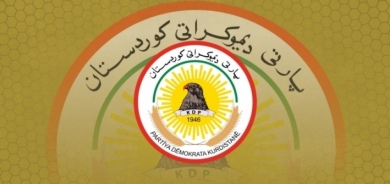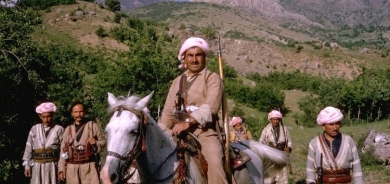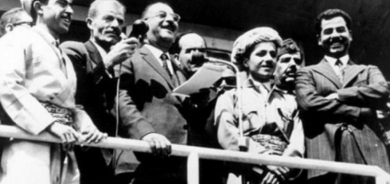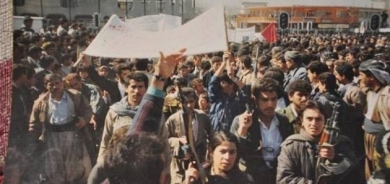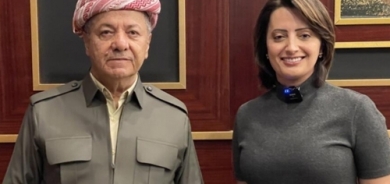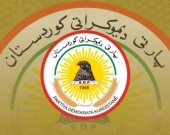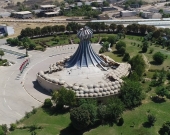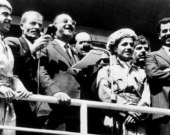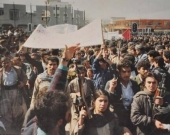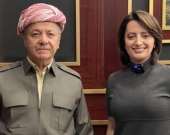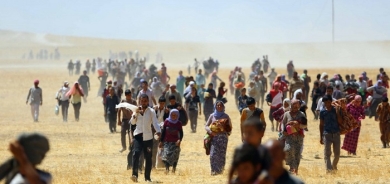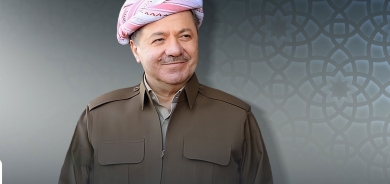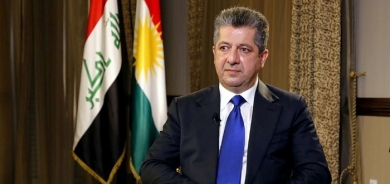Future concerns come with the US withdrawal from Iraq
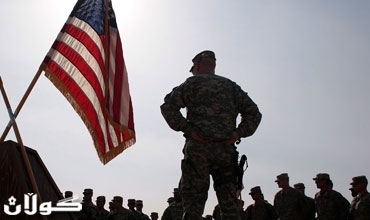
Joost Hiltermann, the Deputy Program Director, Middle East and North Africa, The International Crisis Group, said in an exclusive interview to Gulan Magazine: “It's not at all clear that Iraq would become more unstable as a result of the withdrawal of US troops. The primary threat to the Iraqi state is the fragility of the state itself, and the profound lack of trust between the political factions, as well as politicians' inability to see beyond their personal and partisan interests and outline a vision and program for the country as a whole.”
The fear that Hiltermann expresses, is not the withdrawal of American forces- which cannot stay in Iraq forever- but is that the Iraqi state itself has become a problem. The lack of trust between the political parties prevents the drafting of a common strategic program for all of Iraq. In such a condition, the U.S. forces withdrawal will create gaps in the country that the neighboring countries will exploit. Regarding the threats of the neighbors' interventions into Iraq, the Professor Hiltermann said: “I don't see any immediate prospect for external military intervention in Iraq. And contrary to what you say, neighboring states have exploited Iraq's current state of weakness to support insurgencies in Iraq. They will continue to do so if it serves their interests. I don't see Iraq becoming a threat to international security any time soon. Syria is another matter.”
He also emphasized that the absence of solutions for the disputed territories will impose a threat to the country's unity, he said: “The unity of Iraq is threatened not by the withdrawal of US forces but by the failure of Baghdad and Erbil to find a peaceful resolution to their disputes. The US troop presence has done absolutely nothing to help the parties reach a solution so far (after more than eight years) and indeed arguably has contributed to a deepening of the conflict, so what leads you to believe that keeping US troops in Iraq longer would help in finding a solution? There will not be a civil war as a result of the US troop withdrawal. If at some point in the future a civil war breaks out, the Kurds might further assert their separateness from the rest of Iraq, but that situation has existed already since October 1991.”
Hiltermann also dismissed fears on the security and stability of Kurdistan Region after December 2011, he said: “The Kurds have established a secure region, but it is, perhaps understandably, still far from being democratic. There have been no threats to the region from violence in the rest of Iraq, not even during the height of violence in 2004-2008, so I don't think this is a pressing concern at the moment.”
The American withdrawal and terror threats
One other big concern is that the withdrawal will increase the terrorist activities, though some experts reject this. Professor Muhammad Bamiah, lecturer of political theory and sociology at Pittsburg University, who also specializes in the Middle East affairs, spoke to Gulan Media about this subject: "The controlling of terrorism has nothing to do with the presence of the US Forces or not, it is not a phenomenon that can be controlled by force. The only thing that will help is if have a functioning inclusive democratic system that is open to all the voices, and that is what matters, a lot of troops on ground is not really the answer to anything, because they are another source of the problems themselves. I think some people here believe that the problems can be solved only by force, other think that it would be solved by having a democratic inclusive system. I believe that this is really the question of how really build that kind of system, that be inclusive and open. The United States, due to its presence in the region, especially military existence in countering terrorism, has made the problem even worse. So, I am not really worry about all of this, what I am worry about is whether the system in Iraq will be able to become non-sectarian and inclusive to all citizens, and to respect human rights and so on. And that goes to the Arab countries as well, that is our only hope.” And regarding to the neighboring countries’ intervention in the Iraqi internal affairs after the U.S. Troops withdrawal, the Professor Bamiah added: “every country will be expected to interfere in the affairs of other countries, and that’s the nature of life. It is not as we can live in a situation where there is absolutely no intervention. That will never happen, because to some extend each country has interests in other countries’ internal affairs in the same region. So, there got to be some kind of attempt to influence the internal politics, and that is to be expected, that’s not to be going away. So, the thing that would really make things work well is to have within each country in the region some kind of well developed democratic culture, just to make sure that if attempts for interventions done by any other forces are really would be viewed as an intruder and as any foreign force.”
Another concern many in Iraq has, is that the current government is not trustable in directing the country towards economical development within the Iraqi constitution. Regarding the impact of events in Syria, Professor Muhammad Bamiah said: “Iraq and Syria are two different cases. In Iraq you have a foreign invasion; a foreign power came and occupied the country and toppled the regime. In Syria you have indigenous local revolution, and that is a popular revolution. And the Syrian revolution is to an extent non-violent, even a lot of people have been killed, and the people don’t call for violence, up to this point they want peaceful resolution. This is not all what happen in Iraq, you don’t have any kind of revolutions in Iraq, there are number of rebellions.”
Apart from an Arabic perspective on this issue, Gulan Media also took American perspectives. Keith Crane, Director of Programs of Economics, Energy and Development at RAND think-tank, who is also meanwhile an expert on Iraq, said: "The United States has spent 800 Billion Dollars in Iraq and we have lost 4,000 lives, and I know the Iraqis suffered much more. I think the engagement in Iraq has been one of the most tragic mistakes of the American foreign policy history. And I think that like most of Americans we are very glad to see when our troops is gone continue to have close relations with the Iraqi government, but I think that there is a very large majority in the United States could be happy when all the troops are gone from that country.”
According to surveys, most of Americans think like Professor Crane on the issue of American forces in Iraq. But he said his opinions about the post-withdrawal era are different from the Kurdish one, saying: “I think this is an Iraqi responsibility, it is not a US responsibility. I have great confidence that the Iraqi people will be able to master this problem, but it is definitely an Iraqi problem not a US problem. I think that the Kurdish Region has been an extraordinary source of stability for Iraq; in terms of having much lower of violence and you provided a president for Iraq and engaged in the political process in Baghdad. The Kurdish Region is part of the state of Iraq and the United States recognizes the government in Iraq, so; the United States has warm feelings for the Kurdish people, but within the context of the unified Iraqi. So; the United States has relations with states, and does not has relations with regions.”
Oil and Gas; another problem between KRG-Baghdad
Among other problems the Iraqi government creates for her and for the KRG, is the oil and gas issue and the Kurdistan Region's authority in signing contracts with the international oil companies. The Iraqi government hides itself from passing the hydrocarbon draft law of 2007 which the KRG and Baghdad had agreed on. Muhsin Sa'dun, member of the Iraqi Council of Representatives, spoke to Gulan about this issue: "Based on the copy of the hydrocarbon law, in 2007 both KRG and Baghdad had agreed to pass it and this was supported by the Iraqi Council of Representatives. The talks continued. We agreed to send this copy to the Council of Representatives, in order to become law. The draft solves the problems; accordingly, all the contracts the KRG has signed are legal and constitutional. Evidence for this is the Constitution which allows the regions and provinces to sign contracts with the companies, especially the Kurdistan Region which has its own hydrocarbon law. After the KRG signed a contract with Exxon Mobil to do some explorations, the Iraqi ministry of oil once again said it is unconstitutional. We believe that, in order this problems won't happen again, the draft law of 2007 should be passed as the soonest time, which according to this law, petroleum is the property of the people of Iraq and the Iraqi government cannot control it because Article 111 of the Constitution says: 'Oil and gas is property of all regions and provinces in Iraq.' This law solves this issue."
On the same issue, Gulan Media contacted Hussam A'zzawi, representative on the Iraqiya bloc, who emphasized on the importance of the law. He said: "The most important thing is the law should appeal to all. The hydrocarbon law is still in the Council of Representatives. We are with legislation of the draft and we have said this many time. A while before the Feast, a draft law was passed by the Iraqi Council of Ministers, but it was rejected in the Council of Representatives because there was no consensus about it. We are with the law, in order to bring about a real investment in the countries all resources, which is the property of all the Iraqi people. Unfortunately, some of those problems are political, and so far, the Constitution has not become a base for solutions, whilst, solutions for all the problems should be based on the Constitution. The problems have had also impact on the economic performance of the country. Consensus politics problems have become problems in political work which is having negative implications on the economy and services. I think we should have investment for the natural resources, from Kurdistan to Basra, and the Constitution clearly says that the revenue is centrally distributed. However, the economic management of country is performing badly which has left bad impacts on the ordinary citizens for their income and even on their political stabilities. All these are evidence of the failures of the political consensus and abiding by the political agreements, as we saw during the formation of the current government when the Erbil Agreement was not implemented as the parties had agreed upon."
Translated by: Ari Mamshea

